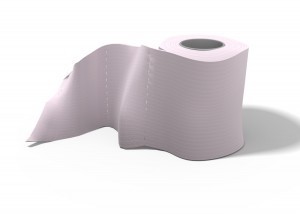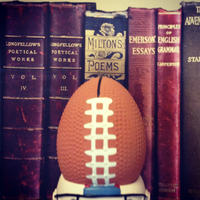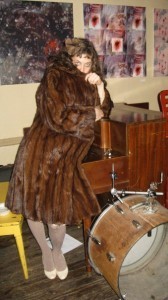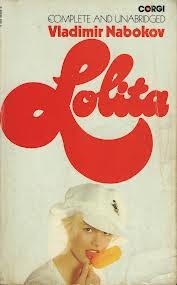The Paris Review's Blog, page 850
February 5, 2013
Literary NFL, and Other News
“The Ravens’ lack of interest thus far in supporting the city’s literary legacy is a travesty.” The Super Bowl doesn’t help Poe!
“Ladies and gentlemen, your Literary National Football League.” (And more!)
Speaking of (sort of) fictional characters inspired by real people...
Doodling and Neuroscience 101. Half of this sounds doable.
“Anthony Trollope, before he set off for his job at the GPO every day, would write three thousand words between 5:30 and 8:30 A. M.. He kept his watch in front of him so he could achieve two hundred fifty words each quarter-hour. If he finished one novel before 8:30, he would instantly start the next one.” Don’t worry: not all writers’ word-counts are this demoralizing inspiring.
February 4, 2013
Show Us Your Soulful Side to Win a Briefcase
I had a briefcase at one point, but it was a kind of 1980s new wave briefcase. It was made of some kind of cardboard and it had metal hinges. It was kind of faux industrial looking, and I used to carry my books in it rather than a backpack. I didn’t want to have normal student accoutrements.
We know the feeling. If you too had a visibly bookish phase, we want to see it: send in a picture of yourself at your most literary, and, in honor of youthful self-seriousness everywhere, you could win a Frank Clegg English Briefcase. Send your picture, along with a brief description of your influences of the time, to contests@theparisreview.org.
February 1, 2013
Luljeta Lleshanaku, Kruja, Albania
A series on what writers from around the world see from their windows.
I usually prefer to write in my bedroom at my childhood home in Kruja. Traces of the old living style are in the yard in the front of window: the sheets hung for drying; the terracotta jars, or magrips, sixty-year-old objects once used by my grandfather as olive oil containers and now cut at the throat, transformed as flower vases; the ruined walls which once fenced in the tomato garden; the alembic, or lambik, which served, in the absence of running water, for washing hands after work. But also present is the invisible, the unseen: the erased objects and the missing human beings; the cut plum tree where my sister and I used to climb up during those beautiful summer mornings; the loud voice of my mother when coming back exhausted from her work; the mulberry tree which brought the insects and the good odor of pegmez, the syrup of condensed fruit; the liming thresholds before holidays; my uncles, my cousins, all those portraits and gestures which once populated this yard.
On this inescapable, familiar stage, I can focus on the pelagic depth of a single and bounded situation. In my case creative freedom doesn’t necessarily mean hunting for a new landscape. This environment leads me toward something unmistakable, which is a kind of freedom, too. —Luljeta Lleshanaku
What We’re Loving: Fires, Isolation, Whispering Gallery
Remember Rod McKuen? He’s the one who wrote those illustrated books of free verse with titles like Come to Me in Silence and Listen to the Warm. In the 1970s, McKuen called himself America’s most popular poet, and he may well have been. Since then he has faded into obscurity, without an heir—until now. For reasons best known to themselves, the poet and singer David Berman, the photographer Michael Schmelling, and the painter-sculptor Friedrich Kunath have created You Owe Me a Feeling, an unlikely late masterpiece in the McKuen mode. “Love is the 51st state,” Berman writes. And: “The whole country is turning / into LA (so let’s move to LA).” And: “Golden / retrievers / aren’t dogs, / they’re dogs / about dogs.” These aperçus appear between portraits of a rugged artiste doing his thing on a Kunath canvas, hefting a giant Kunath shoe, or nuzzling one of Kunath’s human-faced tangerines. It’s kind of hard to describe, but we all loved it, and (even though one of us [Nicole] has an e-mail address borrowed from a David Berman song) none of us happened to be stoned. —Lorin Stein
What better way to celebrate the Centennial of Grand Central station than with a dozen bivalves at the Oyster Bar and a visit to the Whispering Gallery? While there, check out the New York Transit Museum’s exhibit “Grand by Design: A Centennial Celebration of Grand Central Terminal,” on view through March 15. —Sadie Stein Read More »
The Poetics of Football
I grew up outside Boston, a resident of Red Sox Nation, but mine was not a sports-loving household. My father watches football regularly these days, but he didn’t when I was a kid. He’d watch a game if it was on, distractedly, while doing something else. The rest of us did not. We didn’t follow game schedules or scores. I’ve never been to Fenway Park, though my middle school was less than a mile from the Green Monster. When they tore down Boston Garden I expressed manufactured dismay—I’d never been there either. Until I moved to Chicago after college and bought tickets to a few Cubs games on the cheap, at a yard sale, the only professional sporting event I’d ever attended was an early round of the 1994 World Cup—South Korea versus Bolivia—which ended in a tied shutout.
My sister and I played soccer. She was better than me. I figure skated and entertained deluded fantasies of making it to the Olympics, but I couldn’t get any height on my jumps and my spins were too loose and wobbly. Eventually I switched to ice hockey, which I played with the same poor-to-barely-adequate ability as each of my prior athletic endeavors. In college I spent a week on the women’s rugby team before quitting because it hurt. Read More »
Nabokov Museum Vandalized, and Other News
“The common core state standards, a set of math and English goals agreed upon by forty-five states and now being implemented, sends cursive the way of the quill pen, while requiring instead that students be proficient in keyboarding by fourth grade.”
Libraries have gone raucous! Bring back the shush!
The Nabokov Museum has been vandalized by the so-called St. Petersburg Cossacks. Why? For “promoting pedophilia.”
Perfumes inspired by dead writers.
In the UK, doctors will soon be allowed to prescribe books.
January 31, 2013
Getting Caught
 Before our fathers lost their jobs, before the kid at school collapsed on the practice field, before our grandmothers forgot our names, before the first big uprooting, the tug of bourbon, and the crises of faith, there was a shameless season along the cattail-flanked pikes of northeast Nashville, a season as tough to fathom now as it is mortifying to confess, when our biggest concern, at least on weekend nights late, was whose house to roll with toilet paper.
Before our fathers lost their jobs, before the kid at school collapsed on the practice field, before our grandmothers forgot our names, before the first big uprooting, the tug of bourbon, and the crises of faith, there was a shameless season along the cattail-flanked pikes of northeast Nashville, a season as tough to fathom now as it is mortifying to confess, when our biggest concern, at least on weekend nights late, was whose house to roll with toilet paper.
We were restive, brother. We were hemmed in by hills. There were no wars to fight. High-speed Internet had yet to invade the South. So under cover of catching a movie or playing pickup in the church gym, we pooled pocket money and raked the grocery clean of twelve- and twenty-four-packs of tissue. The cashier women could have tipped off the cops. There was no mistaking our intent for a collective case of irritable bowel syndrome. Still they shooed us through the sliding doors, perhaps wagering we might repay their clemency by passing over their cul-de-sacs.
We rolled Laura, the sweetest girl you ever met, and Tyler, the most likely in our class to find a cure for cancer. We rolled whole blocks of strangers. We rolled our next-door neighbors. We rolled Laura again. And in one ballsy feat not likely to be bested this millennium, we rolled our high school basketball coach, a Brobdingnagian who, when he got to shouting, sounded like Darth Vader passing a kidney stone in an echo chamber. Read More »
Is Scotch Tape Scottish?
 Although it is hotly debated, some claim that on this day, in 1930, Scotch Tape was born. But what, you might ask, is particularly Caledonian about pressure-adhesive transparent tape? As About.com explains it, it was rooted in old-fashioned racism!
Although it is hotly debated, some claim that on this day, in 1930, Scotch Tape was born. But what, you might ask, is particularly Caledonian about pressure-adhesive transparent tape? As About.com explains it, it was rooted in old-fashioned racism!
The brand name Scotch came about while Richard Drew was testing his first masking tape to determine how much adhesive he needed to add. The body shop painter became frustrated with the sample masking tape and exclaimed, “Take this tape back to those Scotch bosses of yours and tell them to put more adhesive on it!” The name was soon applied to the entire line of 3M tapes.
Indeed, the brand so embraced the notion of being cheapskates that until 1944 their mascot was one Scotty McTape, a kilted boy with an enthusiasm for tape. And in case you were wondering to which clan the tape belongs, it appears to be unaffiliated.
Hear That Lonesome Gasket Blow: Part 3
 Read part 1 here and part 2 here.
Read part 1 here and part 2 here.
I had only just started stepping to and fro under the shifting blush of light-emitting diodes, and with only the most pitiable amount of rhythm or flair, when a strawberry blond officer of the Wellington Police crossed the dance floor, tapped my shoulder, and asked me to come outside. My first thought was that, at last, I was getting hit on by someone who had their own car. Then I prayed, “Please, please be arresting me for writing about my impressions of the South Island.”
Since arriving, I had not suffered so much as one evil eye in the world’s southernmost capital city (the closest being when I somewhat brusquely thrust a five-dollar note, the front of which shows the grinning profile of explorer Sir Edmund Hillary, at a middle-aged Chinese fruiterer at the Vivian Street open-air green market; she glared at me and my bag of ripe apricots). A peachy, pacific place. What could I have done to attract this sun-damaged arm of the law, aside from describing the kea parrot as a “bastard”? Being a bastard myself, I have nothing but affection for the kea. Had my two-step been so criminal?
“Slow night?” I said.
He asked how much I had been drinking. I managed a modest guess, adding, as he copied the details of my driver’s license onto a clipboard, that I worked for the university.
“And how long have you been here?” The officer pointed his pen at the indefatigably thumping club.
“About two minutes.”
He sighed, embarrassed by his task (a random check, I would later learn), and wrote my two minutes down on his official paperwork. “All right. You wanna head back in?” Read More »
Courier Font Is Improved, and Other News
Paavo Anselm Alexis Hollo, a prolific and accomplished poet, critic, and translator, has died at seventy-eight.
J. D. Salinger once wrote a biographer that he had “borne all the exploitation and loss of privacy I can possibly bear in a single lifetime.” Luckily for him, he won’t be around for the upcoming biography by David Shields and Shane Salerno, released by Simon & Schuster in September.
Courier font has been perfected. Meet Courier Prime, if you dare.
Robert Silvers, at lunch with the FT, talks editing, Zadie, and keeping the Pentagon Papers at the NYRB offices.
“It became clear that we were building a utopian alternate-universe bestseller list—a syllabus for readers who are curious about the best transgressive, funny, gripping memoir and fiction written by every kind of person other than heterosexual men.” On the founding of Emily Books.
The Paris Review's Blog
- The Paris Review's profile
- 305 followers










